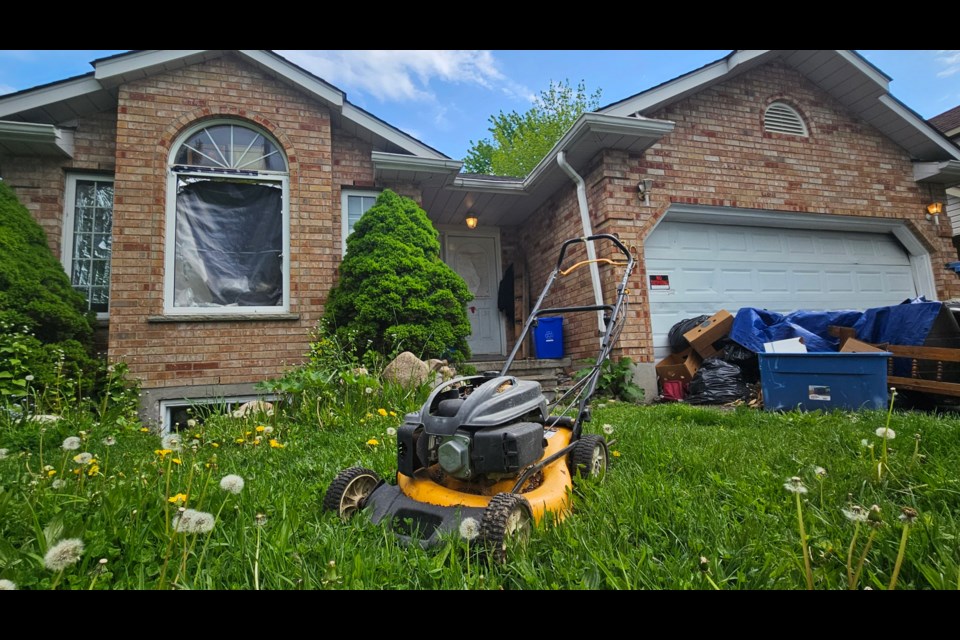It’s been nearly a year since Ryan Bedrosian bought his first home – a three-bedroom backsplit in the city’s west end – with dreams of fixing it up and moving in with his fiance, to whom he proposed days after the purchase was finalized.
The plan was to tear the interior down to the studs and essentially rebuild the living space before moving in by the end of 2023.
That didn’t happen.
Instead, Bedrosian continues to live with his parents as he tries to get a group of alleged squatters removed from the Elmira Road home he bought through a bank sale – all the while making loan payments and watching as the house’s water and electricity bills climb.
Factoring in the cost of complying with city-issued property standards orders to clean up the yard and mounting lawyers fees, as well as land taxes for a property he’s not using, Bedrosian says he is out about $50,000 and counting.
“I feel betrayed,” Bedrosian said, referring to what he perceives as indifference from the City of Guelph and local police, as well as by the legal system he feels has left his life in limbo. “You're helpless. You have zero control of what's happening to you.”
He’s likely not the only one who feels helpless in the situation.
“We see unprecedented growth of encampments and people being unhoused. And this particular situation, I would say, is a symptom of the fact that it's just so unaffordable for people to live,” said Douglas Kwan, the Advocacy Centre for Tenants Ontario’s legal and advocacy director.
“Housing is a key part of living in this society. You can't find a school for your kids to go to if you don't have a home to live in. You don't have shelter. You don't have an address to put on your (work applications). So home is as essential as water or air to provide some stability in your life.”
A man with a salt-and-pepper beard and wearing a baseball cap answered the door when GuelphToday attempted to speak with residents of the Elmira Road home on May 29. He offered, “no comment” before closing and locking the door.
Bedrosian, 30, bought the home in September for $630,000 through a power of sale process. The previous owner died in 2021, he said, explaining the bank reclaimed the home to recoup the remaining mortgage debt.
There were no open houses or showings offered during the sale, but Bedrosian felt comfortable going ahead with the purchase without personally seeing the inside because the house is less than 50 years old.
“How bad could it really be?” he recalls thinking. “I'm handy. I can renovate. I've done one before, so no problem.”
When he asked for the keys after the purchase closed, he said he was told there weren’t any – just walk in. Though he found that odd, that’s exactly what he did.
Accompanied by his fiance’s father, Bedrosian opened the front door to discover six people sitting on the floor and about 10 people overall inside. After telling them he had just bought the house and he wanted them to leave, a woman “picked up her pillow and a small garbage bag and walked down the street in bare feet,” he explained. ”Then other people started to come out (from other rooms) – some old guy probably in their late 60 or 70s, young guys, some guy who said he was just staying with a friend. It's just chaotic.”
When they declined to leave, Bedrosian called Guelph police to report trespassers on his property.
He claimed officers showed up a little while later but, after consulting with the department’s lawyer, they refused to get involved.
“I'm just pissed off because I think it's bullshit. Our tax dollars pay for police to do their job. They are negligent,” Bedrosian said.
A spokesperson for Guelph police declined to comment on Bedrosian's accusations directly.
"Each call related to housing issues is dealt with on a case-by-case basis taking into consideration that the Residential Tenancies Act and residential property ownership rights are civil matters which must be dealt with by the Landlord and Tenant Board or the Superior Court of Justice respectively," police spokesperson Scott Tracey wrote in an email response to GuelphToday. "The Guelph Police Service will assist the sheriff in effecting orders issued by either of those two entities."
At the advice of his lawyer, in October Bedrosian applied to the Landlord Tenant Board (LTB) for an eviction order. His request for an expedited hearing date was denied, with the hearing set for June 18.
“Who knows what's gonna come from that,” said an exasperated Bedrosian. “Fingers crossed.”
The homeowner thought there might be a sooner end in sight last month, but that didn’t materialize.
He said one of the squatters called him and said the group would move out within 48 hours if he paid them $5,000 each. He countered with an offer of $1,300 each, figuring that would be cheaper than his growing legal fees.
“They said ‘that's not enough to cover rent anywhere else, so we're not interested,’ which is crazy,” he said.
Throughout the process to-date, Bedrosian said he’s approached city officials for a variety of assistance, including turning off electricity and water to the home, to no avail.
He said he’s also sought assistance complying with property standards orders.
“There’s just no willingness to resolve a problem,” he said. “It’s just like, ‘Hey, if it’s not theoretically our responsibility, then who cares? So basically, no respect.”
It’s unknown what, if anything, the residents will present to or ask of the LTB.
“(Both sides) need to seek clarity from the Landlord Tenant Board, because until that is finalized, they are, under the law, a tenant with the same rights and security of tenure,” said Kwan.
“And it's important to not prejudge situations until they've had an opportunity to weigh in on the evidence. Much like criminal cases, we presume parties are innocent until proven guilty.”
